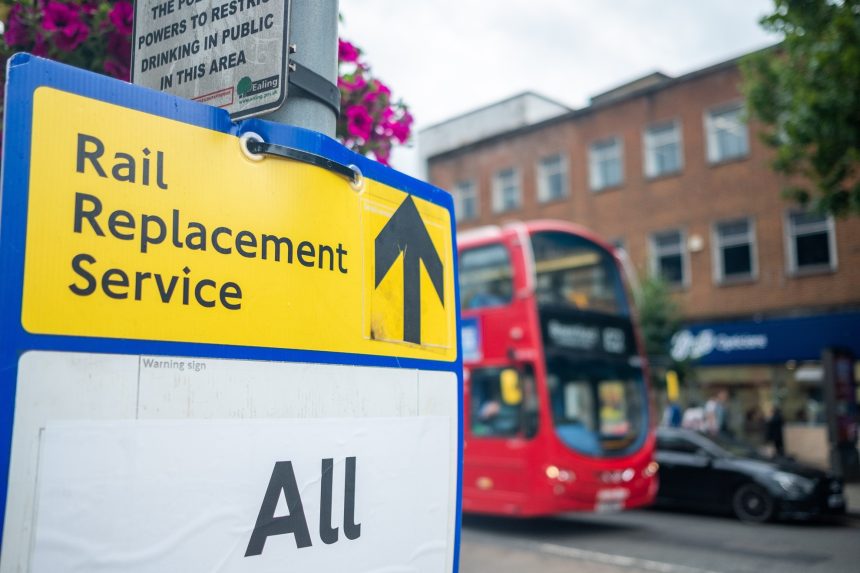The Department for Transport (DfT) will work with the coach sector and rail industry trade body the Rail Delivery Group (RDG) to develop “a pathway” to compliance with the PSV Accessible Information Regulations (PSVAIR) for coaches on in-scope rail replacement services, it says.
While delivering that ultimate position is viewed as being difficult, DfT will engage with Innovate UK on what it calls “innovative market solutions” for lower-cost and easy-to-adopt audio-visual equipment to reduce the burden of PSVAIR compliance placed on smaller operators.
DfT’s overall position on the accessible information regulations and rail replacement is outlined in an impact assessment around the temporary exemption for coaches the that runs until 31 July 2026.
What leverage for AIR on rail replacement?
PSVAIR is separate to the PSV Accessibility Regulations (PSVAR), although the temporary exemption regimes from both for coaches are similar. DfT notes that grant of both is conditional on the rail industry working with it to “ultimately achieve full compliance with accessibility requirements across [rail replacement] services.”
That leaves RDG needing to collaborate with coach operators to implement measures to secure that long-term adherence, although the impact statement gives little, if any, idea of how that will be achieved for compliance with either PSVAIR or PSVAR.
The accessible information regulations began to apply on 1 October. Exemption aside, vehicles first used since October 2019 are currently required to comply when used on in-scope work, which includes some rail replacement. Older vehicles will follow over the coming two years.
DfT accepts that rail replacement is a small proportion of coach operators’ overall revenue and that RDG – which represents train operating companies (TOCs) – has limited leverage to encourage compliance.
RDG has thus advised DfT that many coach operators would forego rail replacement entirely rather than procure the necessary audio-visual kit to comply with PSVAIR, although supply challenges for that equipment are acknowledged. Around two-thirds of rail replacement services are delivered with coaches, the Office of Rail and Road has found.

Major conundrum in arriving at AIR exemption
With the three-step compliance regime for PSVAIR in mind, creating the exemption mechanism saw DfT and RDG explore addressing any resulting shortage of coaches by using older vehicles that in the short-term are out of scope of accessible information regulations.
However, that was ruled out because most newer coaches are “at least partially compliant” with PSVAR, but older ones may not be. Such a tactic would have thus brought policy on PSVAIR into conflict with the aims of PSVAR.
A temporary focus on older coaches could have created what DfT calls “a deleterious travel experience for passengers on vehicles that may still not be PSVAIR compliant, and may also be less accessible overall,” the assessment states. “In a worst-case scenario, the uncertainties pertaining to the supply of vehicles may [have led] to the issuing of do not travel notices.”
Ministers’ ability to intervene on PSVAIR was limited without amending regulations via parliamentary process, which was not possible in a sufficient timescale to avoid the risk of disruption to rail replacement.
A further alternative examined was exempting individual rail replacement services from PSVAIR. That would have required RDG and/or TOCs to notify DfT in advance of planned rail disruption on the need for accessible information regulations exemptions. It was discounted because of a likely high administrative burden.
While the chosen approach has proved to be relatively straightforward, a stipulation that coach operators applied for a PSVAIR exemption by 1 October is understood to have been problematic for some that were not active in rail replacement then but have since sought to become so.
Data a challenge for rail replacement and coach industry
In a hint that a long-term solution to both the accessible information regulations and PSVAR on rail replacement remains some way off, the impact assessment notes RDG’s position that it “does not hold sufficient leverage to alter coach operators’ behaviour.”
Despite that, and in a seeming contradiction, the document says that DfT expects coaches to comply with AIR on in-scope services by conclusion of its rollout in 2026.
It adds that availability of data on both the coach industry and rail replacement services posed a challenge to DfT’s work to address what it calls “a risk” to that provision. That position for coaches was recently highlighted by the Confederation of Passenger Transport and KPMG in the production of a report detailing the economic contribution of coach.
However, DfT plans to strengthen its evidence base on the coach industry, rail replacement provision and PSVAIR compliance to monitor the effectiveness of the exemption from the latter. A post-implementation review of PSVAIR is expected from April 2027.



























